Silkies in the ice, cold and wet of winter
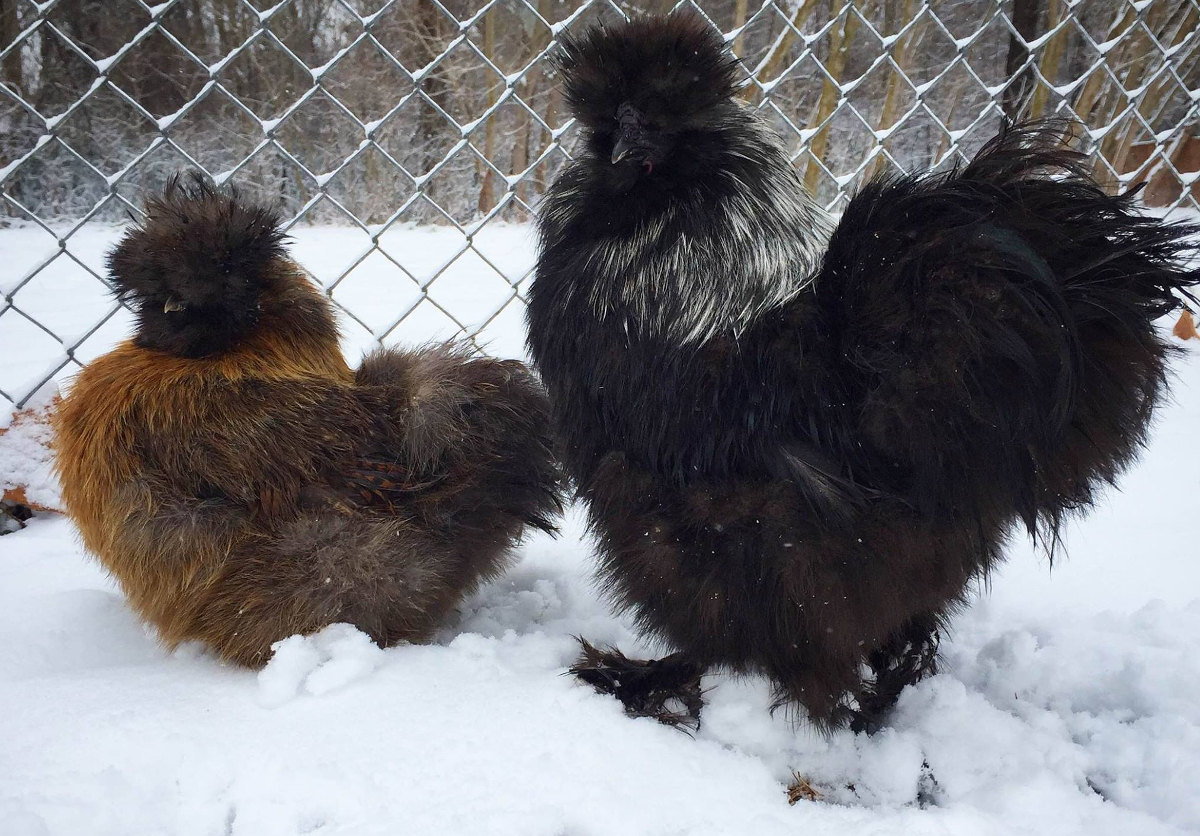
Silkies in winter:
Silkies, but not showgirls, are generally accepted to be a cold hardy chicken breed so if your area is known for getting harsh cold winters they are an appropriate choice.
There is a problem with the feathers being easy to wet and this can chill your flock if you are not careful.
I was the same at first, worrying about my Silkies in winter, but as long as they're not going to bed cold and wet and draughty coop, they'll be fine. I keep reminding myself that Silkies originate from the colder parts of Northern China.
Below: Mine are always getting their heads and faces wet and muddy.
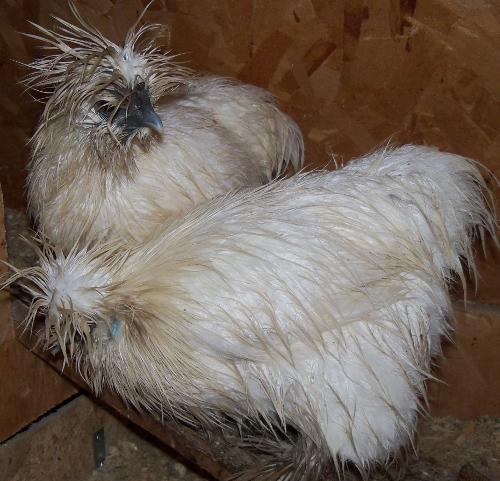
How cold can Silkies handle?
Mine have tolerated -22.4 C or -9 F for several weeks with no side effects at all. Chickens actually seem to do better when it is frozen, damp seems to be more of a problem.
Below: Silkies do well in the cold.
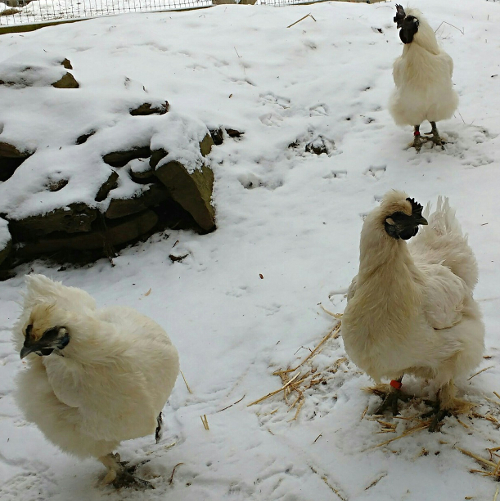
How do you keep Silkies dry?
Cover your pens or runs is really the only way to keep Silkies dry. Mud is no fun for any bird and because of their feather structure Silkies can suffer more than most. You can use a solid roof or cover the run run with a tarpaulin.
I use the plastic cover from a poly-house, hoop greenhouse or grow tunnel, it is cheap, easy to come buy and lasts a few years. It also lets nearly all the light through which is useful in winter.
When the cold weather strikes it's up to us to keep our flock safe and warm. As a rule chickens fare better in cold than in warm weather but should still help them through the hard, cold, winter months. Make use of automatic chicken door openers to let them out at the best times.
General do's and don'ts for chickens and Silkies in winter:
Do Provide proper ventilation - Good ventilation in your coop gets rid of unwanted, moist air. Without good ventilation all this moisture is going to condense as water making the inside of the coop damp and prone to moulds, fungus and pathogens. Vents need to be adjustable and not opposite each other on the coop. This stops draughts which is another major problem for poultry. One should be low down and one high up and they should face away from the direction of the prevailing wind.
Do Provide clean, dry and warm bedding - Just like any other time of year, chickens need clean and dry bedding to live on. During winter your coop bedding must be dry, warm and absorbent. If the bedding gets wet and then freezes, your flock will get frostbitten feet and be very uncomfortable. If the bedding is not warm then you chickens will, obviously, be cold! The best bedding to use in winter is straw or hay. It acts as a natural insulator, boredom buster and prevents frostbite.
Do feed and water your flock well - Chickens drink almost the same amount of water in winter than they do in summer. You may need a heated base or regular changes if it's freezing. Make sure drinkers have a trough they can dip there beaks into without immersing their heads too which they are fond of doing with a water bowl
Do Allow free ranging and access to the run - Chickens have thick feathers which allow them to survive and thrive in cold much better than we ourselves can. They are a lot more hardy than you may think. Even if your temps are below -5 try and open the coop door every day for at least a few hours. Chickens hate being confined all the time and it can cause stress, illness and fighting.
Do keep Vaseline on standby for the chickens' combs and wattles if it is persistently frozen. This helps prevent frostbite.
Don't tightly insulate your coop - Why? Because the tighter the insulation, the more moisture build up is created. This leads back to the whole ventilation deal. Moisture from droppings, breath and humidity all will be increased if you tightly insulate your coop.
Don't allow water or eggs to freeze - Again, either use heated waterers or buy a heated base. Collect eggs more often so they don't freeze.
Don't stop cleaning the coop - Do not put off your coop chores because of the cold. The cleaner the better. Using a poop board will make you life easier as droppings are messy, wet, smelly and can freeze. Refresh the bedding every week or so and spot clean every few days.
Don't allow draughts through the coop - Venting can be adjusted on cold winter nights by closing off some of the lower vents to slow air movement in the coop. You never want to close off the higher vents. You will not retain much heat by closing off the vents. The chickens will be drier with open vents, especially if it is a bitterly cold night and you use heat lamps. Hot air meeting cold air creates condensation, and the best place for this to happen is outside of the hen house.
Should I towel or blow dry chickens before bed?
They can cope fine with with a little wetness on heads and feet but what you don't want ideally is for them to get perpetually soaked to the skin as Silkies being split feathered are walking sponges.
Below: Drying a Silkie chicken. Just wrap them in a towel for a few minutes.
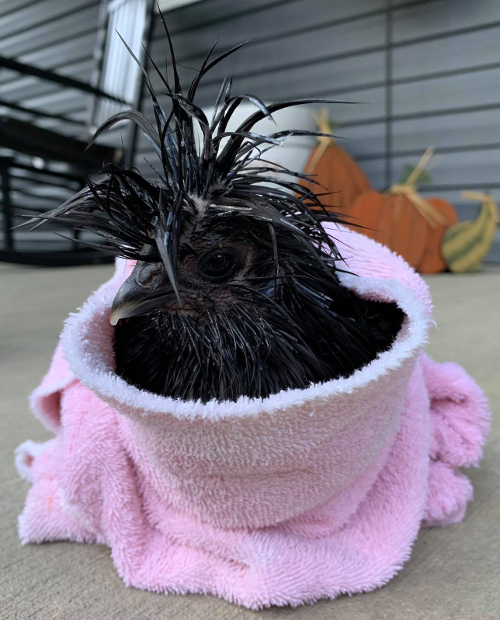
If they are wet to the skin then dry them off a bit or wrap in a towel for a few minutes to get the worst of the moisture off.
It is better to make sure they have eaten heartily of a slowly digested food like grains mixed with cracked corn and a few shelled sunflower seeds. This will mean that their digestive system is working and generating warmth for many hours during the night.
Drying your chickens before bed is not something you want to be doing all the time so consider investing in a covered run to keep the worst of the rain out.
Can a chicken survive in cold weather?
Chickens can survive the cold no problem at all provided they have access to the proper feed and liquid water. I have found that damp and wet weather is more of a problem than snow and ice.
The main stress for all chickens is the sudden change in the weather and temperatures which unfortunately as we know, is often how weather runs sometimes day by day.
The main problem with water in winter is that it turns to ice. This obviously prevents your hens getting access to it, especially if you use a drip feeder where the pipes are blocked with ice.
Chickens must have access to fresh water every day and Silkies are no different. To resolve the freezing issue you can always use heated base to put under your water supply. These are inexpensive and do the job perfectly. Alternatively, keep an extra waterer in the house so that when one gets frozen you can swap over whilst it thaws out.
Chickens can get too cold and even freeze to death but it is very unlikely in the average backyard flock. Much more likely than a chicken freezing to death is it getting to wet and then getting too cold to survive.
I have a friend who keeps his in his garage in the worst weather.
What do I do with chickens in the winter?
Little things to make them more comfortable and as dry as possible without fretting:
- Keeping them clean.
- Provide peck at toys like whole cabbages and swings hung in the coop or run.
- Draught free.
- A few high calorie treats like shelled sunflower seeds.
- Sprout some wheat or barley in seed trays for fresh greens.
- Dry will help them with the temperature variances. Damp is definitely to be avoided.
- Have dry feed and water accessible at all times.
- To prevent snow laying on the run area, you can simply cover the top of the pen with a sheet of polythene from the hardware store.
- Some straw or hay on the ground to keep the chickens feet warmer.
Do chickens need heat in the winter?
As a rule no, chickens do not need extra heat in winter. There are a few exceptions to this this, Growers or young birds, chickens in the moult and frizzles all need extra care in winter and this may mean heat in some parts of the world.
Try a little experiment, when it gets super cold I would go out and feel their feet on the roost, just to check on them. I find that even in below zero temperatures their feet were toasty warm. I also read that using heat lamps makes them less able to regulate their own body temps.
Below: Heated chicken coop can burn down with terrible consequences.
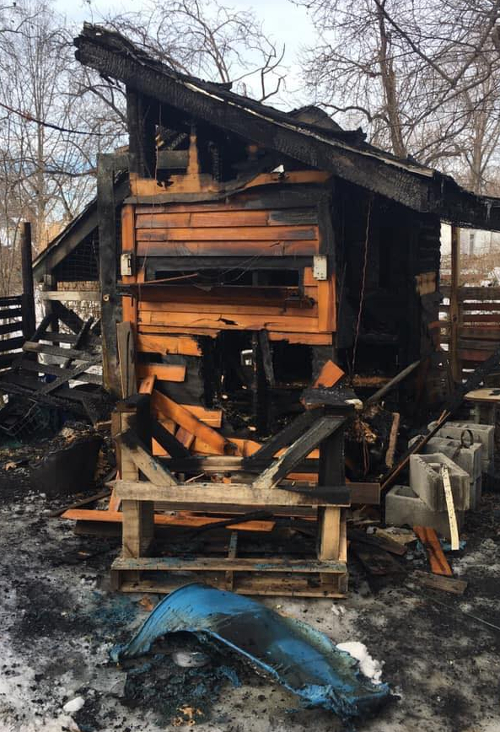
You will be surprised how cold chickens can tolerate as long as they are dry, draught free and well fed and watered. Mine are very comfortable without heat. It gets cold no doubt. Plastic heated waterers do not keep the water thawed. Only the metal ones with heated base or heated dog water bowls work
Heat lamps and such cause fires every year and can potentially wipe out your entire flock while they are trapped inside the coop.
Frostbite on combs:
If you are raising chickens in a cold area, your flock may suffer from frostbite. Roosters are more likely to suffer than hens as the combs are bigger. A well-designed chicken coop helps prevent frostbite, but there's no controlling the weather.
Below: A frostbitten comb.
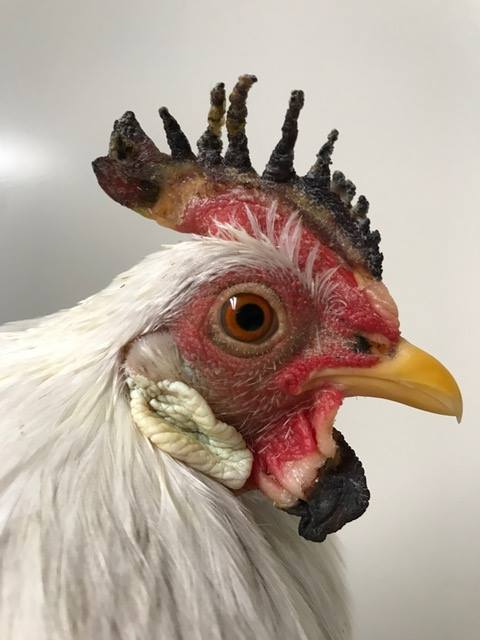
You may find black on your chickens’ combs or wattles, sign of damage. It’s important to understand how to deal with the condition if this ever affects your backyard flock.
Frostbite happens when the tips of the combs freeze in cold weather. It doesn't happen at night as the birds tuck their heads under a wing to keep the heat in.
I have found the best way to apply Vaseline to a chickens comb is warm it till it melts then paint it on with a small brush.
Frostbite causes blackened areas on the ends of combs, wattles, and sometimes toes. In most cases, these areas dry up and fall off eventually. Do not trim off the blackened area unless it gets infected as the blackened area gives some protection to the area below it. When you remove that, the area beneath it may be frostbitten next. Do, however, keep an eye on the area. If infection sets in, you will have to trim the black off the comb or wattle, a process called dubbing.
Rubbing chicken combs and wattles with oil or petroleum jelly can prevent frostbite but it only helps a little and it needs to be put on in a thick layer. If your weather regularly gets down near 0 F, hanging some heat lamps over the roosting area or heating the shelter may help. Don’t heat shelters too much above freezing, because doing so causes moisture problems that may be worse than the cold.
Roosters with frostbitten combs may be temporarily infertile. Usually fertility is restored after conditions improve and the rooster’s body recovers from the stress.
You need to think of your bird’s feet as well. Make sure that your roosts are big enough, that when they are on them, their breast feathers cover their toes. I use 2x4 lumber with the corners rounded off for my roosts, thin side up. Doing this, will virtually eliminate loosing toes. Chickens can handle the cold surprisingly well, even better than they can handle extreme heat. If you have a spot for them to get out of the elements, keep them dubbed, and have nice wide roosts for them, they should be able to handle just about anything!
The ends are dead now. They will fall off & he will have a nice smooth comb. Less susceptible to frostbite.
How cold is too cold for chickens?
Below 32 F or 0 C for non hardy breeds like frizzle, naked necks, showgirls and Asian hard feathered types. Also Old English Game may struggle because of their long legs.
Below: Showgirls are not cold hardy chickens because of the featherless neck.
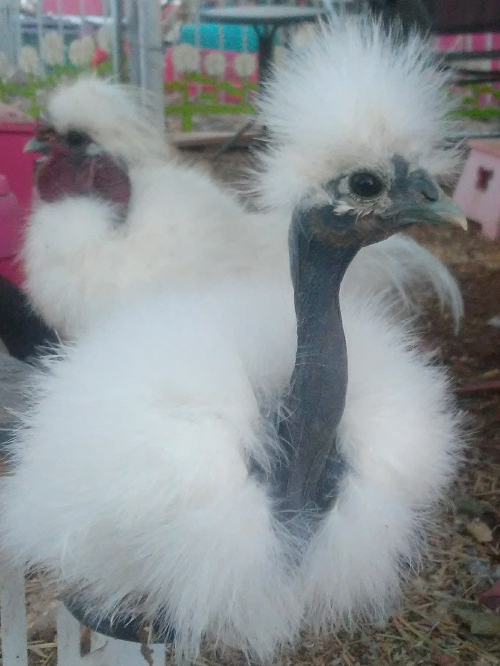
For Cold hardy breeds like the Barnevelder, Silkies and large soft feathered types Should be able to handle 0 F or -18 C with protection from the elements and wind. Roosters may need a little extra care because of their large floppy combs.
The rule is that if it was developed to live in a warm climate like the Asiatics or Mediterranean breeds it will suffer in the cold. If it was developed for cold or northern climates then it will be fine.
Chickens actually cope very well in the cold as their feathers insulate and their core body temperature is high. It actually does them more harm than good to insulate the coop. The majority of healthy, strong, well looked after chickens are perfectly equipped to withstand very cold temperatures.
Below: Chickens in snow and ice.
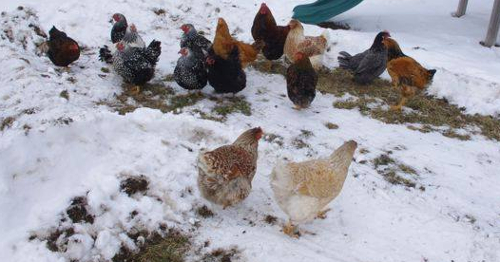
Look at wild birds. They don't have heaters and heat lamps and I have yet to see one killed by cold. With the exception of a very small number of breeds, chickens are protected against the elements by a well designed duvet of feathers that helps them regulate their body temperatures and keep the cold out. They can and will do fine even in extreme cold, even more so if they have a well designed and built coop to overnight in.
As fall ends, chicken keepers need to consider the best ways to look after hens in winter. Here are some tips to help you keep your chickens healthy, happy and laying well during the cold months ahead.
Will chickens lay eggs in the winter?
Yes, chickens will lay eggs in winter but generally at a much slower rate than in the spring and summer. It is quite common for chickens to produce the odd flush off eggs in especially if you get a series of bright sunny days in January. The cold won't stop hens laying it is a day length, light controlled process.
In the winter, the primary concern is the eggs freezing. As long as the temperatures stay around 28 F or higher, you'll likely not see any freezing of eggs that are gathered each day. If eggs are left in the nests for a couple of days at or below freezing, you might have some cracks develop, but most likely you'll just get a little "egg slush" developing inside.
Below: Frozen eggs.
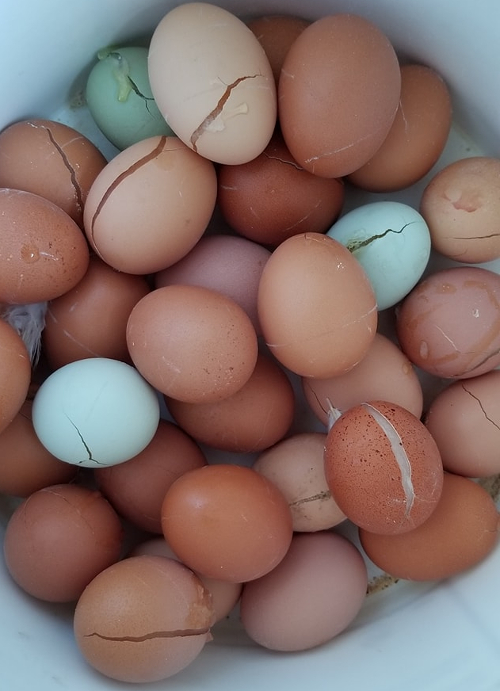
In order to keep them laying well, remember to ensure that the percentage of protein in their diet stays at the same level.
There is a direct link between the amount of daylight and the number of eggs hens lay. Naturally, hens will lay less in the darkest months.
If your weather is in the teens or twenties, you'll need to make certain the eggs are collected each day to avoid freezing and breaking. Collecting your chicken eggs soon after laying is the best idea, but you can usually get away with letting them sit out there a bit longer if needs be.
What chickens do best in cold weather?
Australorp chickens are very hardy and long lived. They can also adopt themselves well with low temperatures and cold weather.
Barnevelders, Orpingtons, Wyandottes also make excellent cold weather choices for your flock.
Size itself makes little difference to how cold hardy chickens are. My bantams do just as well as large fowl in winter.
Can chickens stay outside in the winter?
Although most hens won’t find snow attractive, they will still go out and look for food if they get the opportunity. Don’t prevent this, if it’s too cold for them they’ll soon find their way back inside, and allowing them out when they want will prevent them going cabin crazy and plucking out their own feathers.
Mine are kept in sheltered covered runs so they’re not exposed to wet muddy or frozen conditions. I only allow them to free range when it’s dry and I’m home.
It’s fine to do now as long as you dry them completely so they’re not damp. They could catch a chill otherwise.
Can chickens sleep outside in the cold?
This is to be avoided if at all possible. Whilst chickens can stay warm on a perch
I once had this happen a few years ago when I had a few young roosters that started sleeping out and about despite my best efforts. The one morning I found them with their feet frozen to the perch they were on. I ended up having to dispatch them as they would never have survived frozen feet.
How to keep chickens warm in winter without electricity:
The deep litter method is one of the best ways of warming chickens in the depths of winter without any electricity. It involves a deep base that generates warmth.
Encourage roosting to keep your hens warm - Roosting is the way chickens’ naturally keep warm when it’s cold. They huddle together on their perches with their heads tucked under a wing and their feathers fluffed, sharing their body heat with each other. For this to happen you need to provide them with the means to do this. Ensure there is plenty of perch space for all the chickens to sit and roost together. If needs be put in a few extra perches or make your current ones longer so more birds can sit together.
You can keep the temperature in the coop from plummeting in a number of easy ways. The frost way is simply to move the coop into a place sheltered from the winter wind such as next to a hedge, fence or wall. This means that when the freezing winds blow in your coop will be protected from the worst of its effects.
Insulating your coop can also prevent the cold from getting in and heat escaping. There are a variety of materials which can be used for this, but the cheapest and probably most effective is simply to recycle the corrugated cardboard you have hanging around the house.
Use this to build and inner layer by fixing it to the inner walls and roof – remember not to block up the ventilation holes though. Even in winter it’s important that air is allowed to circulate to remove ammonia and decrease the possibility of the hens developing respiratory infections.
For the floor of the run or pen a good thick layer of straw will provide a good barrier to ground frost and keep your hens feet from getting too cold. If you think the temperature will get to a seriously low level, then you can always invest in an infrared Heat Lamp to take the chill out of the air.
How cold can baby chickens tolerate?
Day old chicks need an absolute minimum of 35C and even this might be a bit low. As they get older they can tolerate lower temperatures and by 8 weeks or so of age they can get by without supplemental heat as long as the weather is not cold and damp.
Feeding chickens in winter:
Chickens don’t really need a big change to their feed in winter, but some small adjustments can make all the difference. The main change will be in quantity of layer pellets that the chickens will eat; during winter hens can eat up to 10% more than in summer and this enable them to bulk up, providing an extra internal layer of insulation.
The only other change would be to give them a few greens as the ones that naturally occur during summer will have disappeared. A little bit of tonic now and then will help.
I feed mine seed mix just before roosting and add seaweed flakes and dried garlic granules to their feed to help keep them in good health.
Growers pellets or even some chick crumb with the higher protein content will help keep them in condition too. In really cold weather a few high calorie seeds like shelled sunflower seeds.
Keep supplies in the cupboard in preparation for illness as if any weaker birds do show illness at this time of the year , speed is of the essence. But for a healthy bird, the cold is not a problem at all.
Conclusion:
Remember, wintering is a chore which should NOT be taken lightly. Chickens can and will die if you do not properly prepare them for the upcoming season.
I also use some of my wives old throw away throw rugs on my shop porch and in a couple of other covered outdoors areas so when they decide to take a rest from pecking and scratching they have something that keeps them from hunkering down on the cold ground. I take them up if its going to be wet so they are always dry for them .
Wind is the biggest causes of frostbite when the thermometer drops. On cold cold windy days I keep them in and they do fine they can still peck and scratch and get in the hay and seem to be happy. They like hay better than straw for the seed clusters and its a finer fibre, smells good and they like it in the coop but it must be kept clean and replace it
